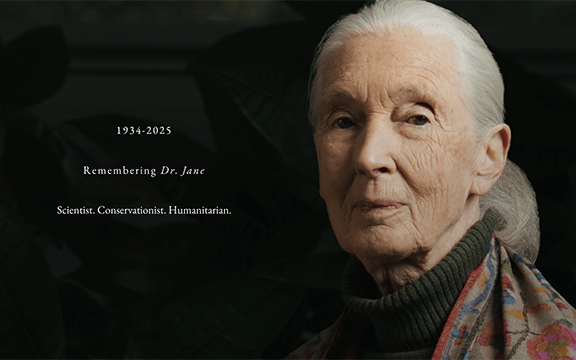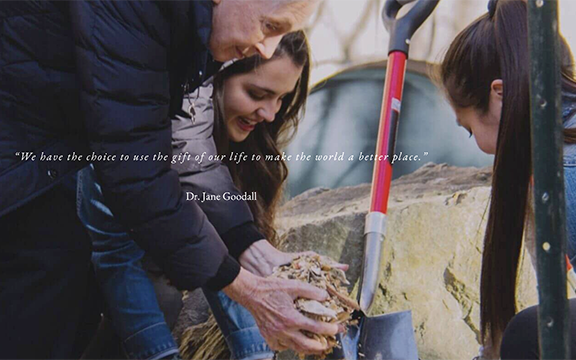
Photo courtesy of janegoodall.org
The world has lost one of its most steadfast voices for the voiceless: Dr. Jane Goodall. Her life was nothing short of a living hymn to compassion, curiosity, and courage. Integral Yoga Magazine, steeped in the ideals of harmony, nonviolence, and the unity of life, we bow in homage and reflection, remembering how her mission closely mirrors the deepest aspirations of yogic living.
A life grounded in radical empathy
From the earliest days of her work among chimpanzees at Gombe, Goodall showed us that animals are not “other” but that they are alive, sentient, social, emotional. She accepted the most radical possibility of her time: that our closest primate cousins have personalities, emotions, and agency. She upended prevailing scientific dogmas that tool use, moral behavior, family bonds, and grief were uniquely human. In doing so, she helped dissolve the separation we feel from the natural world.
She often said, “Only if we understand, can we care. Only if we care, we will help. Only if we help, we shall be saved.” That sequence resonates deeply with yogic philosophy: awareness, compassion, and service. In Yoga, we seek to wake up to the inner life of all beings, respond with universal love (maitri, karuna), and act with right intention (Karma Yoga).
She lived that path—not in abstraction, but in daily decisions of voice, travel, education, and choice.
Ahimsa and dietary evolution
One of the tangible bridges between Jane Goodall’s life and yogic values is her embrace of nonviolence in diet. Goodall’s own journey in this regard has been gradual but consistent, reflecting both moral awakening and pragmatic humility.
In a 2017 essay, she declared, “I stopped eating meat some 50 years ago when I looked at the pork chop on my plate and thought: this represents fear, pain, death. That did it, and I went plant-based instantly.” She framed the choice not as austerity but as recognition: of suffering, of ecological consequence, of our shared world.
She further wrote that she hopes others will consider “what this choice really means on a moral and practical level for animals and the environment.” Over time, she leaned more fully toward veganism. As reported, by 2025 she was describing herself as “vegan and fit as a fiddle.”
In 2021, she published a cookbook titled #EATMEATLESS: Good for Animals, the Earth & All to promote plant-based recipes and the ethical imperative behind reducing animal consumption. Through that work, she invited readers to see diet not as a restriction but as an expression of respect for all beings.
In yogic tradition, ahimsa (non-injury, nonviolence) is often considered the foundational yama (ethical restraint). While Yoga does not universally demand vegetarianism or veganism, Swami Satchidananda, as well as many Yoga teachers and practitioners, have seen the choice to reduce harm in diet as a living extension of the principle. Jane Goodall’s life embodies that bridge: she did not merely theorize compassion; she sought to live it, including on her plate.

Photo courtesy of janegoodall.org
Interconnectedness, service, and “roots & shoots”
Another powerful locus of resonance is her emphasis on interconnectedness and youth empowerment. Her founding of the Roots & Shoots program (now active in nearly 100 countries) encouraged young people to see how their everyday choices—what they plant, how they treat animals, how they live—ripple outward.
This is, in essence, yogic vision: the microcosm reflects the macrocosm; there is no separation between self, community, and Earth. In Yoga, we speak of universal union (Yoga = union). Goodall’s life was a call to widen our circle of care, not as a moral burden, but as an extension of what is natural, sacred, alive. She once said, “My mission is to create a world where we can live in harmony with nature.” That vision echoes Integral Yoga’s values: a world where human consciousness grows in step with the evolutionary well-being of Earth.
She also urged, “The least I can do is speak out for those who cannot speak for themselves.” In that, she was an exemplar of Karma Yoga — selfless action, grounded not in ego, but in love and responsibility.
The yogic legacy of hope and resilience
One of the most striking things about Jane Goodall is how she held hope not as naïveté but as a discipline. She distinguished hope from blind optimism: real hope demands action. She said: “Hope is often misunderstood. People tend to think that it is simply passive wishful thinking… This is indeed the opposite of real hope, which requires action and engagement.”
This attitude resonates deeply with Integral Yoga’s view that spiritual life should never be escapist, but precisely grounded in hope that is lived, acted, and widened.
Despite decades of environmental crises, habitat loss, climate instability, and political resistance, she persisted. She traveled widely well into her nineties, lectured, taught, inspired, nurtured youth, and advocated for policy, science, and grassroots action. Her faith was not in illusions but in the capacity of human beings, especially young people, to shift direction.
As we honor Jane Goodall’s passing, we might ask: how do we translate her legacy into living practice in our community of yogic aspiration?
- Cultivate daily compassion: In Yoga practice (asana, pranayama, meditation), hold not only your own body but also the more-than-human world in awareness. Let your breath carry love to all beings.
- Revisit dietary commitment: For readers drawn to Yoga, reflect on whether your diet aligns with ahimsa. Perhaps experiment with more plant-based meals, in the spirit of Goodall’s invitation to examine what our food represents.
- Engage youth, plant roots: Encourage the younger generation to think locally—what can they restore, protect, share? Like Roots & Shoots, small acts of care ripple outward.
- Speak for the voiceless: Use your platform to highlight human and nonhuman suffering, and promote policies that protect habitat, regulate factory farming, preserve biodiversity.
- Hold hopeful action: When the crises seem overwhelming, remember Goodall’s lesson: hope is most alive when grounded in tangible steps, however small, sustained, and collective.
Jane Goodall’s life was an extended sutra of compassion in action. She embodied the principle that to be spiritual is not to turn away, but to turn toward suffering, toward healing, toward transformation. Her choices around diet, her courage in speaking for the voiceless, her conviction in young people, and her faith in the possibility of change are all deeply resonant with yogic ideals.
May we feel not just gratitude to Jane Goodall, but an invitation: to walk more carefully, more openly, more generously in the footsteps of one who taught us to see with the eyes of love. In this spirit, her legacy will be more than a memorial, it will be a living transmission.

